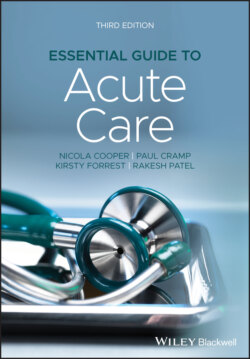Читать книгу Essential Guide to Acute Care - Nicola Cooper - Страница 23
Special Considerations in the Geriatric Population
ОглавлениеThe proportion of older people in the population is increasing. Around 80% of people aged over 80 years function well and relatively independently and only 13.7% of people aged over 85 years live in institutions in the UK.20 However, there are important physiological differences in this age group which are important for healthcare staff to understand. The interpretation of symptoms and signs and the management of acute illnesses may be different in the elderly population.
The following are important physiological differences in older people:
Reduced homeostatic reserve: ageing is associated with a decline in organ function with a reduced ability to compensate. The following are reduced – normal PaO2, cerebral blood flow, maximum heart rate and cardiac reserve, maximum oxygen consumption, renal blood flow, maximum urinary concentration, and sodium and water homeostasis
Impaired immunity: older patients commonly do not have a fever or raised white cell count in infection. Hypothermia may occur instead. A rigid abdomen is uncommon in the older people with an acute abdomen – they are likely to have a soft, but generally tender abdomen despite perforation, ischaemia, or peritonitis. A lower threshold for imaging is therefore required
Different pharmacokinetics and pharmacodynamics: a different approach to anaesthesia is required, and iatrogenic disease is more common in the older population
Acute illnesses present atypically e.g. with delirium or falls
Quiescent diseases are exacerbated by acute illness e.g. heart failure may occur due to pneumonia, old neurological signs may become more pronounced with an acute infection
Some clinical findings are not necessarily pathological in older people: neck stiffness, fine crackles at the lung bases, reduced skin turgor, and bacteriuria. A urinary tract infection cannot be diagnosed on the basis of urinalysis alone.
Clinical decision‐making should always be made on an individual basis and never on the basis of age alone. However, one has to balance the right to high‐quality care without age discrimination with the wisdom to avoid aggressive but ultimately futile interventions. Involving an experienced physician in difficult decision‐making is often helpful.
